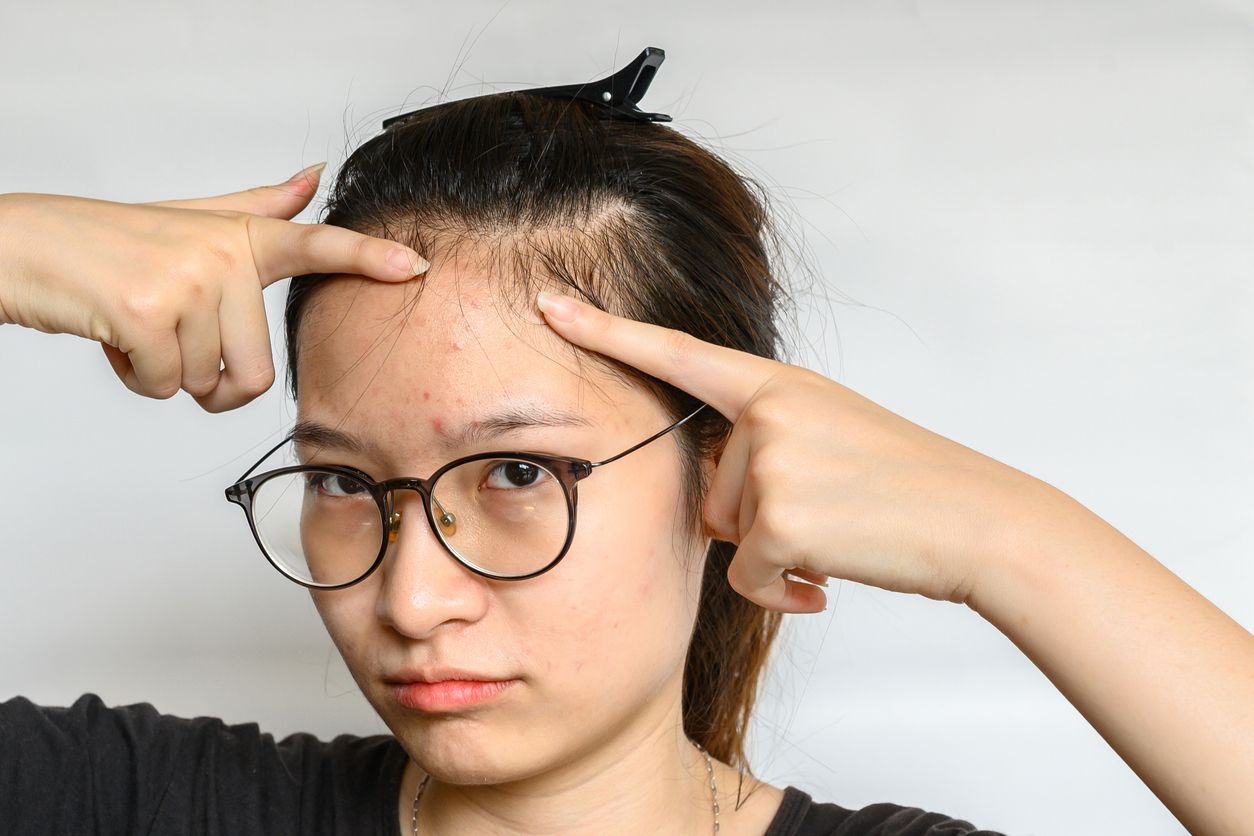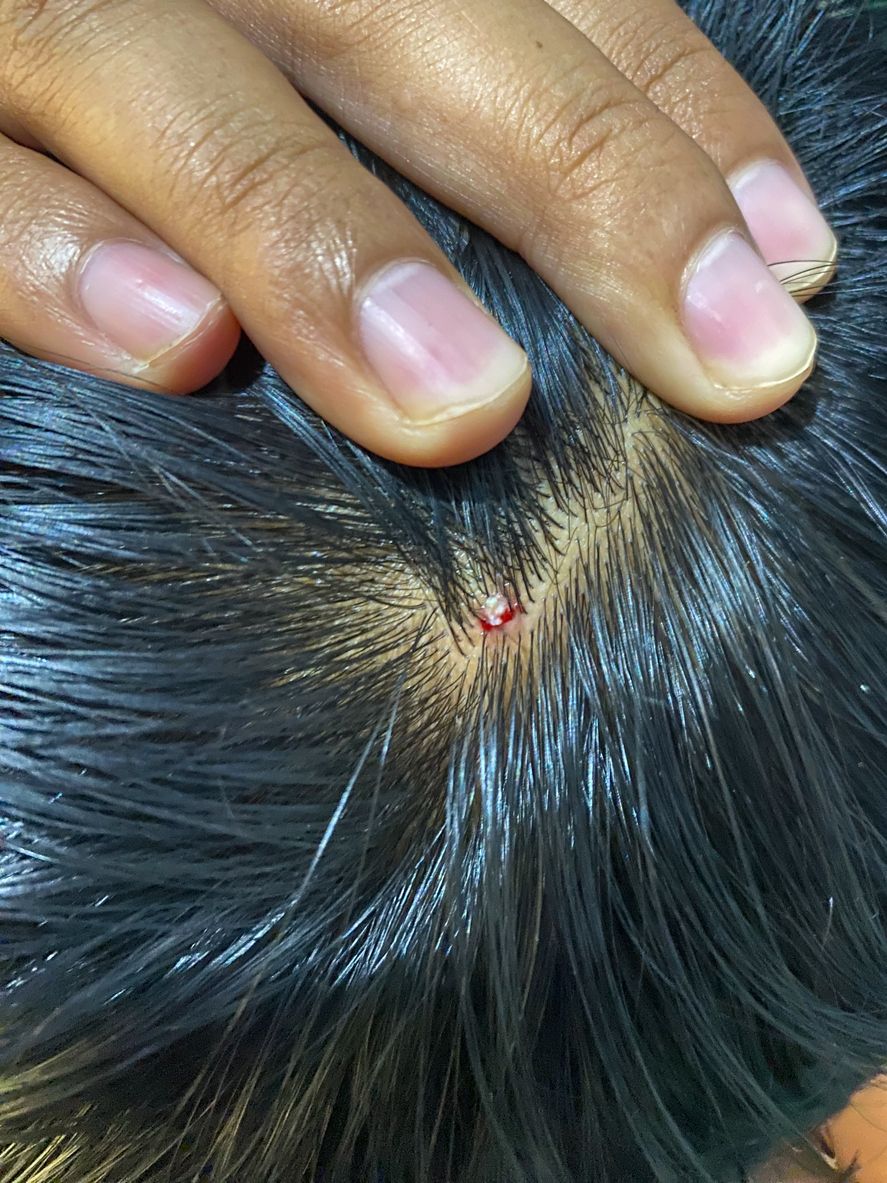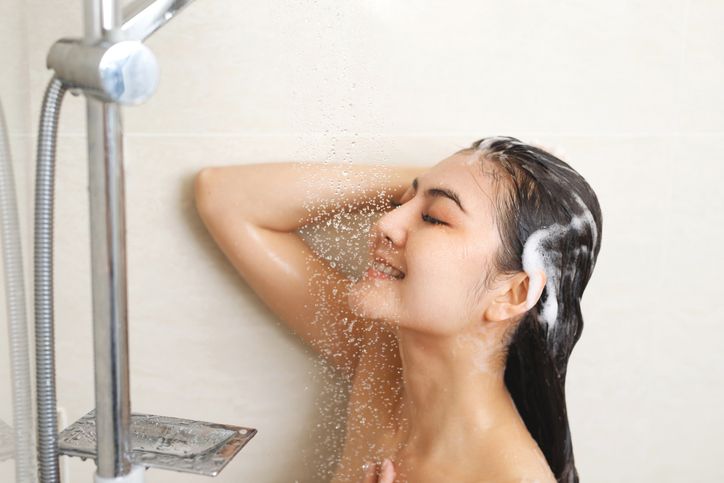
- Home
- Trend
- Weight Loss Strategies
- Acne Tips
- Hair Health Information
- Blemish Removal Tips
- Acne Scar Removal Tips
- Muscle Building Techniques
- Intimate Care Tips
- Postpartum Intimate Care
- Eye Bags Wiki
- Tips for Face Slimming
- Secret of Permanent Hair Removal
- Breast Enlargement Tips
- Cure to Snoring
- Marionette Lines
- Skin-Tightening Secrets
Scalp acne solutions have become a hot topic among beauty lovers today. That’s because more and more people are experiencing pimples on the scalp, yet there’s still a lack of reliable, science-backed information about this type of skin issue! Scalp pimples usually begin with an itchy scalp. At first, scratching may just lead to some flaking, but if bacteria under your nails invade your scalp, it can trigger folliculitis — and that’s what we call scalp acne.
There’s no need to be ashamed of having scalp acne — and it’s definitely not an untreatable condition. In this article, we’ll break down the causes of scalp pimples and share 6 must-know treatment methods. Solving this issue isn’t hard, and the sooner you deal with it, the better your chances of preventing hair loss!
The 3 Main Causes of Scalp Acne: A Scalp Crisis from Inside and Out!

Cause 1: Internal Factors
• Excess Sebum Production: People with oily scalps are more prone to scalp acne due to higher oil production, which clogs hair follicles and encourages microbial inflammation. However, this isn’t limited to naturally oily scalps. Hormonal imbalances (like during puberty, menstruation, or pregnancy) or chronic stress can also lead to excess sebum and eventually folliculitis.
• Constitutional Factors: From a traditional Chinese medicine (TCM) perspective, those with “damp-heat” body constitutions are more susceptible to skin issues like scalp pimples. Excess oils, waste, and toxins in the body tend to accumulate on the scalp, causing breakouts.
Cause 2: External Factors
• Humidity & Pollution in Hong Kong: Environmental changes can affect scalp balance. If your scalp can’t adjust to the climate, it may produce more oil as a defense mechanism, making it a breeding ground for bacteria and increasing the risk of infection and clogged follicles.
• Improper Haircare Habits and Products: Washing your hair too often or not enough, or using shampoos and conditioners that don't suit your scalp type, can contribute to scalp acne. Hairstyling products like gel and wax also tend to leave residues that block hair follicles.
• Wearing Helmets or Hats for Too Long: Prolonged wearing of hats can trap heat and moisture, creating the perfect conditions for bacterial growth and poor scalp health, which in turn leads to breakouts.
• Dirty Pillows and Combs: Everyday items like pillowcases and brushes often harbor bacteria. Even though they’re in close contact with your scalp, they’re frequently overlooked when it comes to cleaning.
Cause 3: Lifestyle Habits
• Poor Diet: Diets high in sugar, oil, or spicy foods can overstimulate oil glands, making your scalp feel greasy and triggering acne.
• Lack of Sleep and Stress: These reduce your immune system’s ability to protect the scalp, leaving it vulnerable to infections and inflammation.
Bonus: 5 Risk Factors That Worsen Scalp Acne and Harm Your Appearance
Ignoring scalp acne may lead to the following:
• Scalp inflammation, redness, swelling, and pain: Often chronic and hard to fully cure, this can lead to both physical and emotional distress.
• Large pus-filled pimples: Just like facial acne, but harder to manage.
• Increased dandruff: Flakes on your hair can negatively affect your appearance, making you look messy.
• Brittle, weak hair: The hair becomes fragile and loses its strength.
• Hair loss from damaged follicles: In severe cases, this can even lead to baldness.
6 Best Ways to Treat Scalp Acne: Dermatologist-Approved Scalp Care Tip

1. Gently Cleanse the Scalp
• Choose sulfate-free shampoos with natural ingredients, especially those without silicones.
• Use proper shampooing techniques: lather shampoo in your hands, apply to the scalp, and gently massage using your fingertips — not your nails.
• Avoid over-cleansing: shampooing 2–3 times per week is enough to prevent chemical overexposure and preserve the scalp’s natural oil balance.
2. Use Haircare Products Correctly
• Always choose products suitable for your scalp and hair type. Read the instructions to ensure proper usage.
• Apply conditioner, hair oils, and masks only to hair ends — never to the scalp.
• Rinse thoroughly every time you wash your hair to avoid product buildup.
3. Keep Your Scalp Clean and Dry
• After washing, pat dry with a towel and use a hairdryer on a low heat setting.
• If you wear hats, give your scalp some air occasionally to prevent trapped heat and moisture from triggering breakouts.
4. Improve Your Diet and Lifestyle
• Reduce stress and get sufficient sleep — better rest helps your scalp metabolize and detox naturally.
• Eat a balanced diet rich in vitamin A, E, and zinc — nutrients essential for healthy follicles — and cut back on sugary, greasy foods.
5. Maintain Good Hygiene Habits
• Regularly change and clean your pillowcases.
• Clean your combs and hats often to prevent bacterial buildup.
6. Relax Your Scalp
• Incorporate regular scalp massages into your routine to prevent pimples.
• For a more luxurious option, consider occasional scalp spa treatments.
免費體驗
F8 Hair Regrowth Treatment
1 Minute Self-Registration
Date should not be before minimal date
3 Common Medical Treatments for Scalp Acne: Are Clinical Options the Safest Bet?
Important Reminder: If your scalp acne is severe, always consult a dermatologist. Don’t self-diagnose or treat!
Medicated Shampoos
• Shampoos with Ketoconazole: Help suppress fungi and significantly reduce inflammation caused by excess sebum.
• Shampoos with Selenium Sulfide or Zinc Pyrithione: Remove excess oil and dandruff while regulating oil production, making it harder for scalp acne to persist.
Prescription Medications
• Topical antibiotics or steroid creams/solutions: These soothe inflammation and itching, helping pimples dry out and heal.
• Oral antibiotics or isotretinoin (Accutane): Used in more severe cases to suppress excess oil production and restore scalp clarity.
Professional Scalp Treatments
• Scalp SPA: Targeted at cleansing and detoxifying the follicles to eliminate acne-causing buildup.
• Hair Regrowth Therapy: Uses non-invasive medical-grade technology to improve scalp health and reduce breakouts while promoting hair growth.
The Ultimate Scalp Acne Solution: Perfect Medical F8 Hair Regrowth Treatment
A dual-purpose treatment that tackles both acne and hair loss — talk about value for money!
Wondering if there’s a fast, effective way to get rid of scalp pimples? Yes — try the Perfect Medical F8 Hair Regrowth Treatment! This advanced program uses low-energy medical-grade soft lasers that are gentle on the scalp. By improving scalp health, it provides an ideal environment for follicle recovery and new hair growth. The result? Healthier, stronger, and denser hair.
This treatment is also suitable for those facing:
• General hair thinning
• Receding hairline
• Telogen effluvium
• Seborrheic hair loss
• Postpartum hair loss
• Stress-related hair loss
Enjoy a stress-free consultation that includes:
• Professional scalp analysis
• Perfect Medical F8 Hair Regrowth Treatment
Just lie back and let the experts solve your scalp problems!
Try Today: Perfect Medical F8 Hair Regrowth Treatment免費體驗
F8 Hair Regrowth Treatment
1 Minute Self-Registration
Date should not be before minimal date
FAQ

What is scalp acne?
Scalp acne refers to bacterial infections and inflammation on the scalp, where hair follicles become inflamed, similar to acne on the face.
Can I use facial acne cream on scalp pimples?
Some acne creams can be used, but always consult a dermatologist before applying any topical medication to the scalp.
Can scalp acne cause hair loss?
Yes. If the condition worsens, it may damage the follicles and eventually lead to hair loss.
What’s the main cause of scalp acne?
It varies from person to person, but poor scalp hygiene or using overly harsh shampoos that disrupt the oil-water balance are common causes.
If my scalp acne worsens, which doctor should I see?
Start by consulting a dermatologist. They can evaluate your scalp care routine and recommend the appropriate treatment.








